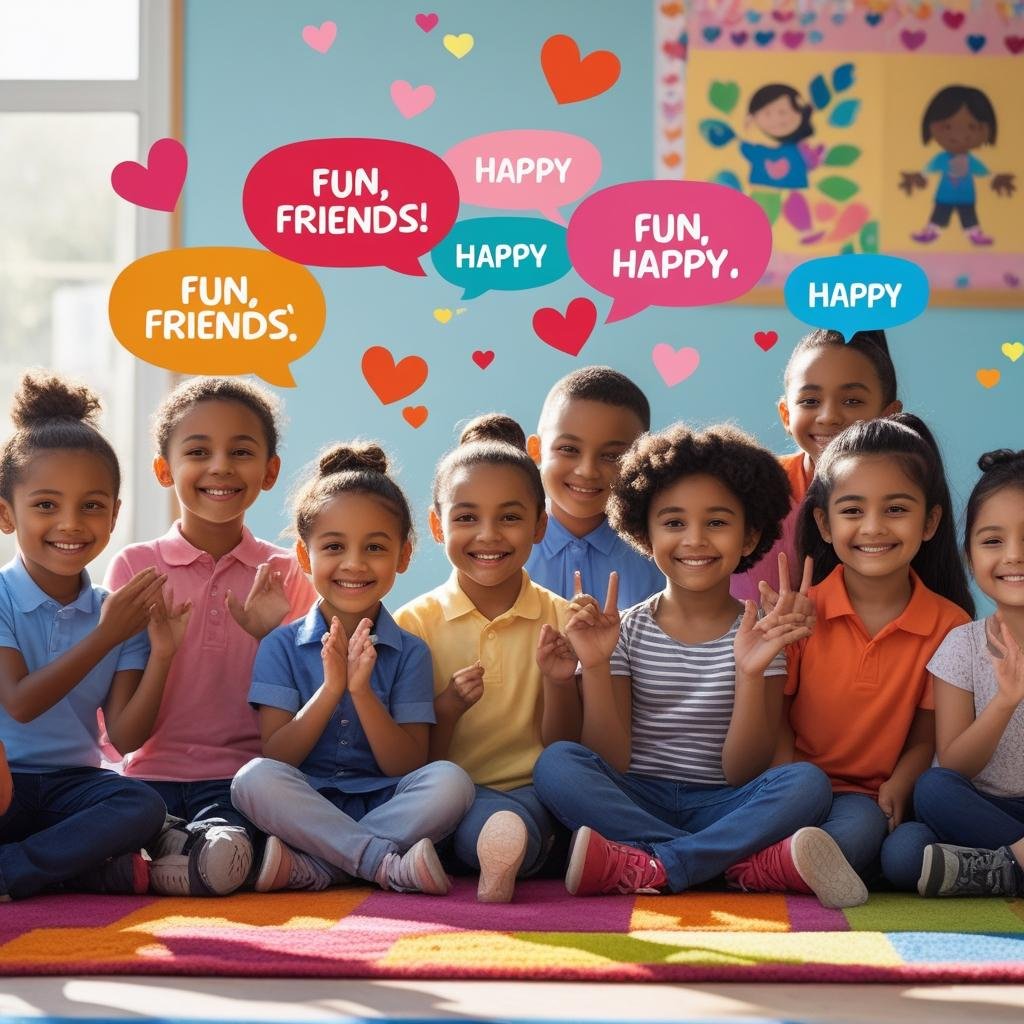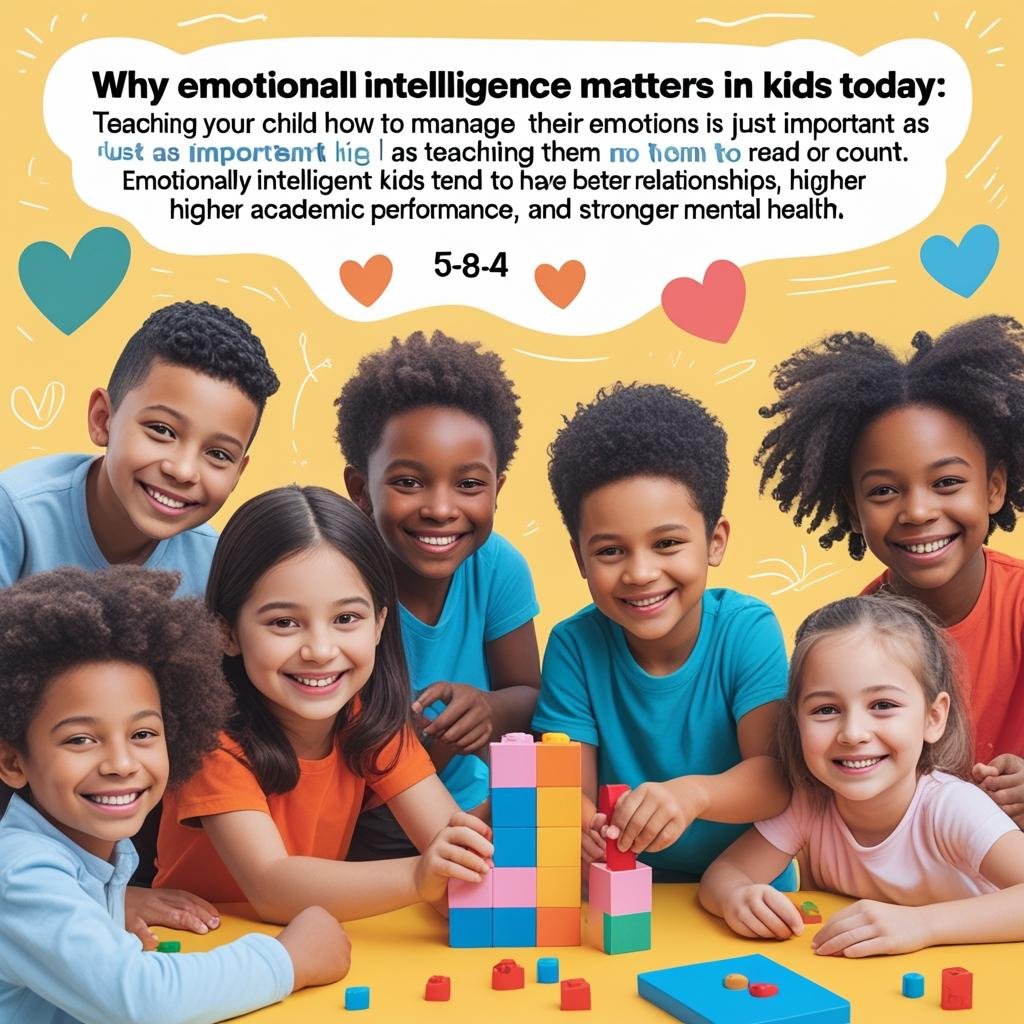Introduction: Why Emotional Intelligence Matters in Kids Today

In today’s fast-paced and high-stress world, teaching your child how to manage their emotions is just as important as teaching them to read or count. Raising emotionally intelligent children is not just a trend — it’s backed by decades of research in psychology and neuroscience. Emotionally intelligent kids tend to have better relationships, higher academic performance, and stronger mental health.
But what does it mean to raise an emotionally intelligent child? And how can parents actively build those skills from a young age?
In this article, we’ll explore:
- What emotional intelligence means for children
- The brain science behind emotional growth
- Practical tips to nurture emotional intelligence at home
- Real-life examples every parent can relate to
What Is Emotional Intelligence in Children?
Emotional Intelligence (EQ) refers to the ability to understand, manage, and express emotions effectively — both your own and those of others. For children, this means:
- Identifying their feelings (e.g., “I feel sad.”)
- Regulating their emotions (e.g., calming down after being upset)
- Showing empathy for others
- Building healthy relationships
- Solving conflicts peacefully
Components of Emotional Intelligence in Kids:
According to psychologist Daniel Goleman, EQ includes five main components:
- Self-awareness – Recognizing one’s emotions and how they affect thoughts and behavior.
- Self-regulation – Managing emotions appropriately and constructively.
- Motivation – Using emotions to achieve goals, persist through challenges.
- Empathy – Understanding and feeling what others experience.
- Social skills – Navigating social situations and building positive connections.
The Brain Science Behind Emotional Intelligence
Emotions aren’t just “soft skills” — they’re hardwired in the brain. Understanding the neuroscience can help parents support their child’s emotional development better.
Key Areas of the Brain:
- Amygdala: Processes fear and emotional responses.
- Prefrontal Cortex: Helps with decision-making and self-regulation.
- Hippocampus: Connects emotions to memories.
During early childhood, these brain areas are still developing. Children don’t have the full ability to control their emotions — which is why tantrums, crying, or impulsive behavior are normal. Your guidance helps shape how their brains respond to emotions in the long run.
Real-Life Example:
4-year-old Aarav used to throw toys when frustrated. His mom, instead of punishing him immediately, would say, “It’s okay to feel angry, but let’s talk about it.” Over time, Aarav learned to pause and express himself with words like, “I’m mad because I can’t play now.”
This approach builds the neural pathways needed for emotional self-control.
Why Raising Emotionally Intelligent Children Benefits Their Future

Research shows that kids with high EQ:
- Do better in schoolhttp://theparenzy.com
- Are more empathetic and cooperative
- Handle stress more effectively
- Have fewer behavioral issues
- Grow into more successful adults
A long-term study published in the journal Child Development found that kindergartners with higher social-emotional skills were more likely to graduate from high school and less likely to develop substance abuse problems later.
How to Raise Emotionally Intelligent Children – 7 Practical Strategies
Let’s break it down into actionable, daily parenting habits that nurture EQ.
1. Name Emotions to Tame Emotions
When kids can name what they feel, they begin to understand it. This is called “emotion labeling.”
Try this:
When your child says “I hate this!” instead of reacting with “Don’t say that!”, try:
“You sound really frustrated. Want to talk about it?”
Tip: Use an “emotion chart” for younger kids to point to what they’re feeling.
2. Model Emotional Intelligence Yourself
Children learn EQ not by lectures, but by watching you. If you yell or bottle up emotions, they’ll do the same. Show them how to process emotions healthily.
Example:
When you’re stressed after work, say:
“I’m feeling overwhelmed right now. I’m going to take a deep breath and relax before we talk.”
3. Teach Coping Tools
Equip your child with emotional regulation tools they can use when upset.
Simple Coping Techniques:
- Deep breathing (smell the flower, blow out the candle)
- Drawing how they feel
- Going for a short walk
- Listening to calming music
Story:
8-year-old Zoya had anxiety before school presentations. Her dad taught her the “5-4-3-2-1 grounding technique” (naming 5 things she can see, 4 she can touch, etc.). It became her go-to before big days.
4. Praise Effort and Emotions, Not Just Outcomes
Instead of saying “Good job on the test,” try:
“You must feel proud of how hard you studied — that effort really paid off.”
This reinforces a growth mindset and teaches children to value their inner experience.
5. Foster Empathy Through Everyday Situations
Ask reflective questions like:
- “How do you think your friend felt when that happened?”
- “What can we do to help someone who’s sad?”
Activities That Build Empathy:
- Reading books with emotional themes
- Volunteering or donating toys
- Role-playing different perspectives
6. Set Boundaries with Compassion
EQ doesn’t mean being permissive. It’s about validating emotions and guiding behavior.
Instead of: “Stop crying, or I’ll take your toy away.”
Say: “I see you’re upset. It’s okay to cry, but throwing toys is not safe. Let’s calm down together.”
7. Encourage Open Conversations at Home
Make emotional check-ins a part of daily life:
- “What was the best and hardest part of your day?”
- “Did anything make you feel sad or worried today?”
Dinner time, bedtime, or car rides are great moments for emotional sharing.
How Schools and Society Can Help Too
While parenting plays a big role, schools and communities must also support emotional development:
- Include Social-Emotional Learning (SEL) in classrooms
- Train teachers in emotional coaching
- Build peer support groups and mindfulness clubs
If you’re a teacher or school leader, look into EQ programs like:
- Zones of Regulation
- Second Step
- RULER by Yale Center for Emotional Intelligence
Frequently Asked Questions (FAQs)
Q: Is emotional intelligence more important than IQ?
A: Both are important. But EQ often determines how well a child handles pressure, solves problems, and builds relationships — all key for long-term success.
Q: My child cries often. Is that a sign of low EQ?
A: Not at all! Expressing emotions is part of building EQ. It’s how you help your child process those feelings that matters.
Q: Can emotional intelligence be taught to teenagers too?
A: Absolutely. While early childhood is ideal, teens can still learn emotional regulation, empathy, and self-awareness through consistent support.
Final Thoughts: Small Steps, Big Impact
Raising emotionally intelligent children is a lifelong journey — not a one-time lesson. Every hug, every conversation, and every time you listen with empathy, you’re shaping a child who understands themselves and others deeply.
Emotionally intelligent kids grow into emotionally resilient adults — and the world needs more of them.
So take a breath, slow down, and connect. Your child’s heart is learning from you every single day.
Did you enjoy this post on raising emotionally intelligent children?
Share your thoughts or parenting experiences in the comments below — and don’t forget to subscribe for more research-based, heart-led parenting tips.http://theparenzy.com





Pingback: Top 7 Mistakes New Parents Make (And How to Avoid Them) - Theparentzy.com
Pingback: Effective Communication Tips for Building Strong Parent-Child Relationships - Theparentzy.com
Pingback: 10 best popular nursery rhymes for young children - Theparentzy.com
Pingback: How to Raise Confident and Happy Kids: A Parent’s Guide - Theparentzy.com
Pingback: Type of child Abuse - Theparentzy.com